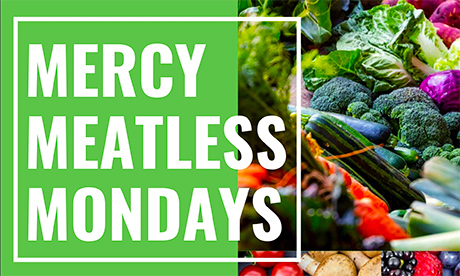From eggplant lasagna to lentil sloppy joes, the Sisters of Mercy have cooked up some of their favourite vegetarian recipes as a way to invite Catholics to join them in eating less meat this Lent — and not just on Fridays.
This year, the religious congregation is extending the Lenten tradition of abstaining from meat on Fridays to add Mondays in what they’re calling Mercy Meatless Mondays.
The program is a continuation of one they began during the 2019 Season of Creation (Sept. 1-Oct. 4) and builds on the wider Meatless Mondays movement to address climate change with more plant-based diets.
“It fits in really nicely with our commitment to care for Earth,” said Mercy Sr. Suzanne Gallagher, justice coordinator for the Mid-Atlantic Community.
“Just think, three times a day you can choose to care for Earth. I think that’s amazing.”
Roughly one-quarter of global greenhouse gas emissions produced by human activity come from agriculture, forestry and other land use, according to the United Nations Intergovernmental Panel on Climate Change — or about double the emissions from all cars on the planet.
The global food system, including pre- and post-production activities, accounts for as much as 37% of total greenhouse gas emissions.
Producing meat for consumption, and in particular beef, requires huge amounts of water and land.
As forests are cleared for pastures, carbon dioxide stored in the trees is released, and fewer trees remain to absorb the planet-heating emissions from the atmosphere.
While many parts of the world don’t have meat-based diets, global meat consumption has grown 20% in the past decade.
Studies have shown that reducing meat consumption is one of the critical steps to curb climate change, and to meet the Paris Agreement goals of limiting global temperature rise as low at 1.5 degrees Celsius (2.7 degrees Fahrenheit).
An August report from the U.N.’s Intergovernmental Panel on Climate Change found that dietary changes, including featuring more plant-based foods, could eliminate annually by 2050 up to 8 gigatons of carbon emissions, or the equivalent emissions from 1.7 billion cars.
Initially, a U.S. government effort during World War I to reduce consumption of staple meal items, Meatless Mondays was revitalized in the early 2000s as a campaign to benefit both human health and the environment.
Part of the climate impact from meat is tied to deforestation to clear land for cattle grazing.
The massive fires that consumed large swaths of the Amazon rainforest last summer were in part triggered by ranchers and farmers setting fire to sections of the land to prepare for planting or to create pasture for cattle herds.
At the Vatican’s special synod for the Amazon, held in October, Bishop Karel Marinus Choennie of Paramaribo, Suriname, critiqued calls from the Western world for South American nations to save the rainforest without examining the role that Western nations’ own lifestyles, including diets, play in fueling its destruction.
“Even if we implement all the measures against deforestation or against the polluting of the rivers, it would still not have an effect if [people in] the Western world — Europe, America, Japan and China — don’t change their lifestyles,” he said at an Oct. 22 press briefing.
The Amazon bishop singled out meat consumption specifically, saying, “The forest is disappearing because Europe and China and the rest of the rich world want to eat meat.”
The idea of Meatless Mondays came onto the radar of the Sisters of Mercy justice team from the Sisters, Servants of the Immaculate Heart of Mary, in Monroe, Michigan, who last year integrated the practice into their Lenten observance. Continue reading
